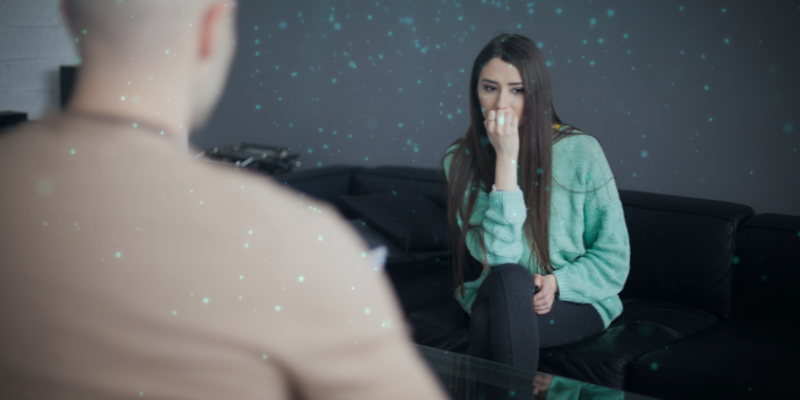
In the pandemic, depression is hitting Americans harder than COVID-19. A new study from JAMA Network Open found that half of U.S. adults are experiencing some symptoms of depression. That’s 3 times higher than the pre-pandemic rate.
These statistics are depressing and will contribute to a legacy of mental health problems. But there’s one industry that’s happy about the alarming trend—the pharmaceutical industry.
THE MIND MED REVOLUTION
In 1987, with the FDA approval of the blockbuster antidepressant (fluoxetine) Prozac, the mind-drug revolution began to dominate psychiatry. Since the launch of Prozac, antidepressant use in the U.S. has increased by 400% and more than 1 in 10 Americans now takes one. Antidepressants are the second most commonly prescribed drug in the United States, just after cholesterol-lowering drugs, according to a paper in the American Psychological Association.
Since the launch of Prozac, antidepressant use in the U.S. has increased 400% and more than 1 in 10 Americans now takes one. Click To TweetAfter the global success of Prozac, the “chemical imbalance” theory of mental illness burst into the public consciousness, and many people began proactively asking their doctors to fix their low moods with pills. Famously, after actress Carrie Fisher was cremated, her ashes were placed in a green and white Prozac-pill shaped urn.
Taking pills may seem like an easier and quicker solution to bad moods than taking the time and effort to develop brain-healthy habits, build skills, or change troublesome behavior. Yet, there is a dark side to the mind-meds that is often overlooked. Thousands of lawsuits claim that Prozac and other psychiatric medications increase violent or suicidal behavior. Virtually all antidepressants and antipsychotic medications have black box warnings, which, in simple terms means the FDA cautions patients in the strongest terms to pay close attention to potentially extremely harmful or dangerous threats to their health.
At Amen Clinics, we have published papers on depression (Journal of Alzheimer’s Disease), as well as on ADD/ADHD (Journal of Psychoactive Drugs), revealing the SPECT patterns that are associated with both positive and negative responses to medications.
PILL PUSHERS
Despite the problems, the pharmaceutical industry is incredibly successful at marketing psychiatric medications to doctors and the general public. From 1996 to 2005, the industry tripled its marketing budget with a 500% increase in direct-to-consumer advertising.
Prescription drug ads often do not adequately explain side effects, and because of repeated exposure, many people tune out those statements at the end of TV commercials, often delivered in a rapid-fire manner, such as, “This drug may cause permanent liver damage, seizures, an allergic reaction that leads to fatal throat swelling and suicidal tendencies.” Patients in the U.S. are more than twice as likely to ask for drugs seen in ads compared with those in Canada, where most direct-to-consumer advertising is prohibited.
There is no doubt that psychiatric medication saves lives, especially for people who have more serious mental health disorders (which are really brain health issues), such as bipolar disorder and schizophrenia. Yet, it’s critical to be cautious with antidepressants, because once they are started, they can be hard to stop, and they do not just reset your brain, they change it.
A 2017 Oxford University study in the Journal of Affective Disorders found most SSRIs—such as Prozac, Paxil, Zoloft, and Lexapro—do not just decrease negative emotions, they reduce all emotions, including love, happiness, and joy. Participants felt separated from their surroundings and cared less about important things in their daily lives. They felt like their personalities had changed.
WHO’S PRESCRIBING ANTIDEPRESSANTS?
One of the most disturbing trends is that nearly 85% of psychiatric medications are prescribed by primary care physicians, nurse practitioners, and physician assistants in short office visits; and 72% of these prescriptions are accompanied by no diagnosis in the charts, according to research in Health Affairs.
These medical professionals often do not have the time or specialized training to develop comprehensive treatment plans or to tell you about more natural and safer solutions. Some primary care physicians do a wonderful job handling mental health issues, while others cause more harm than needed.
THINK SKILLS, NOT PILLS
As record numbers of people experience depression due to the pandemic, our society does not need more of the same in terms of treatment. When it comes to depression, we need skills, not just pills.
When it comes to depression, we need skills, not just pills. Click To TweetIt’s time for a new way forward that is rooted in neuroscience and hope. Depression and other psychiatric issues really are so much more than just a “mental illness.” Your brain creates your mind. The issues that affect your mind stem from your brain, your body, your thoughts, your social and work interactions with others, and your deepest sense of meaning and purpose. To fully heal from depression, you need to address all of these factors. Only then can you feel the way you’d like to feel and live the life you desire.
Depression, anxiety, and other mental health issues can’t wait. During these uncertain times, your mental well-being is more important than ever and waiting until life gets back to “normal” is likely to make your symptoms worsen over time.
At Amen Clinics, we’re here for you. We offer in-clinic brain scanning and appointments, as well as mental telehealth, remote clinical evaluations, and video therapy for adults, children, and couples. Find out more by speaking to a specialist today at 888-288-9834. If all our specialists are busy helping others, you can also schedule a time to talk.





I’ve watched as famil and friends succumbed to electr-shock therapy, surgery’s, prescribed and non -prescribed medications, alcohol, various home grown drugs food abuse and. Excessive behaviors of many kinds. They didn’t ever produce a positive result for individuals or community they belonged to Though they had numerous co-conspirators I didn’t think any were really happy communities
Comment by Sandra Fisher — September 18, 2020 @ 4:44 AM
Where are you located do you accept medicaid
Comment by Aretha Dixon — September 18, 2020 @ 5:44 AM
Any known resource in Michigan for in clinic brain scanning?
Comment by V Zim — September 18, 2020 @ 7:17 AM
Your holistic approach to mental health and your cited research has helped me stay on a safer path……i have learned a lot and have shared it with others……thank you
Comment by sally shinn — September 18, 2020 @ 7:20 AM
My daughter took BrainMD supplements for years along with paying attention to her diet and exercise. Unfortunately her depression worsened. She started taking fluoxetine last May and while she needed some tweaks in the dosage, she is finally doing better. Her sleep schedule is better, she can actually complete her assignments in college and she says that she feels “like a happier version” of herself. Supplements, diet and exercise are definitely important and are a great way to start. If they provide the help needed, excellent, but drugs do have their place.
Comment by Susan — September 18, 2020 @ 9:16 AM
I have been taking temazapam for a year- avg four times a week. 15mg. Have now been off of them for four nights. Will your gaba calming supplement help me transition away from this benzodiazepine
Comment by Maria — September 18, 2020 @ 1:24 PM
We have spends over $5000 out of pocket, for recommenced spec and supplements per Amen clinic recommendations. No positive results seen in patient, no support found from Amen clinic How much more some one can spend out of pocket when your treatment not covered with any insurance. This is seems like for celebrities who can spends tons of money.
Comment by Npar — September 18, 2020 @ 5:17 PM
Regarding the person who asked about getting a scan in Michigan: I live in Wyoming and flew to Chicago to get my scans. I then drove to Detroit to visit family. It is worth it to drive to Chicago, you are closer than Wyoming, it’s well worth the trip!!
Comment by Amy — September 18, 2020 @ 9:17 PM
I have chronic depression and I’m taking the highest dose of Effexor 375mgs a day plus Abilify to make it work! Is there any hope of getting off all this medication?
Comment by Lisa Riley — September 19, 2020 @ 4:07 AM
Thank you for all you do to talk about depression/anxiety and ending stigma of mental health. I love what you did with Transformation Church as optimizing mental and/or physical health require mind body and spirit approach.
Comment by SC — September 19, 2020 @ 9:05 AM
@Lisa Riley! Yes There is a way to get off your anti-Depressants:) I was on Zoloft for 10 years and got off Last year with my Doctors help! She would Lower my dose about every six weeks and would check in with me! I feel sooooooo much better. I still have good days and bad days but I have learned so many skills and tools that I implement daily and I also use CBD which is amazing
Comment by Jasmine Delarosa — September 20, 2020 @ 12:52 PM
Hello Lisa, thank you for reaching out. If you’d like to have a consultation with one of our psychiatrists, please contact our Care Coordinators for more information: https://amenclinics.com/schedule-visit/.
Comment by Amen Clinics — September 20, 2020 @ 7:16 PM
Hello Npar, thank you for reaching out and sharing. We are sorry to hear your feedback on our clinics and your treatment plan. We’d be happy to speak to you and see if there’s anything we can do to assist you further. Please reach out to our team here: https://amenclinics.com/schedule-visit/.
Comment by Amen Clinics — September 20, 2020 @ 7:17 PM
Hello V Zim, thank you for reaching out. Currently, we have 8 locations (https://amenclinics.com/locations/). If you’re unable to travel to one of our locations, our Care Coordinators may be able to assist you with resources or referrals closer to you. Please contact our team here: https://amenclinics.com/schedule-visit/.
Comment by Amen Clinics — September 20, 2020 @ 7:20 PM
Hello Aretha, thank you for reaching out. We currently have 8 locations (https://amenclinics.com/locations/) and we’re opening a 9th location in Dallas, TX this Fall 2020. Amen Clinics is an out-of-network provider, but we’d be happy to reach out to you with additional information on insurance, reimbursement, and financing options.
Comment by Amen Clinics — September 20, 2020 @ 7:21 PM
I have successfully integrated medications and nutraceuticals over the years. I am quite convinced at this point that the majority of individuals who take medications for brain functioning (e.g., depression, ADD, anxiety, et al) can take nutraceuticals and receive as much benefit, if not more. (Instead of Prozac, think St. John’s Wort or Saffron, or 5-HTP.)
I think people should know about fluoride: it’s a neurotoxin., and it is included in most SSRIs, with the exception being Zoloft. I have taken a low dose of Zoloft for going on two decades, along with two other brain medications (I wouldn’t touch the other SSRIs, given the fluoride content); the other two medications I take are for ADD subtypes (types II and VII, per the Amen Clinic model). I also take a handful of supplements that have changed my life for the better: ALC, ginkgo biloba (eB6 verified), fish oil, multiple vitamin, vitamins E, D and C; Zinc, methyloflate, selenium, methyl-B12; B-Complex, Magnesium, cinnamon. I also walk every day, fast, as if I’m in a hurry, for a minimum of 30 consecutive minutes. As Dr. Amen as pointed out in one of his books, doing so for a period of time is as effective (if not more) than an SSRI.
Comment by Terry — October 1, 2020 @ 9:47 PM